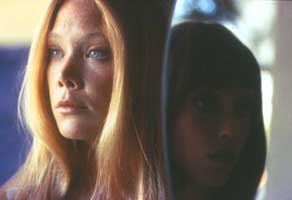"Sissy's Roles" (1977) - Robert Altman Meets "Saturday Night Live"

Without the proper context, a partial list of hosts of “Saturday Night Live” in its sophomore year could almost deceive someone into thinking that there’s some long lost Robert Altman opus out there. Such distinctive Altman regulars as Karen Black (Nashville), Shelley Duvall (very nearly every film of his 1970s output), Elliot Gould (M*A*S*H; The Long Goodbye; California Split), Sissy Spacek (3 Women), and Lily Tomlin (Nashville; Short Cuts; the upcoming A Prairie Home Companion) all took turns presiding over the show during its 1976-1977 season. Altman only contributed to the Spacek episode, but in this short film he gave audiences an invigorating, if ephemeral, glimpse into his then upcoming 3 Women by combining footage from that work with snippets of Alan Rudolph’s Welcome to L.A., a production he helped to get made for his former assistant director.
First airing on March 12, 1977, the episode also contained another pre-filmed short subject, directed by Gary Weis, in which a baton-twirling Sissy Spacek pantomimed to David Bowie’s “Fame”. But in the last half hour, Spacek introduced a “home movie” by Robert Altman, and set the stage for a truly avant-garde work that was heretofore unprecedented in his oeuvre. This television oddity also marked the first time he worked in the medium since before M*A*S*H, his breakthrough counterculture hit from 1970.
Heard on the soundtrack in the opening scene – which un-squeezes the 2.35:1 anamorphic dimensions of 3 Women, considerably narrowing the frame, and making it all too easy to demarcate which footage is which -- one can hear the voice of Altman as he calls out before the clapper during the scene in which Shelley Duvall and Spacek converse over vanilla milkshakes: “Here she goes…Action!”. A country jingle faintly strikes up, which will continue throughout the two minute and eighteen second short. Comprised of twenty-one shots, Altman hints at the “identity theft” at play between Duvall and Spacek in 3 Women during this most unconventional trailer. Spacek introduces herself to off-camera persons -- first as Ann Goode (Sally Kellerman’s character in Welcome to L.A.), then Linda (her real name in that film), Pinky (“but my real name is Mildred…” from 3 Women), and finally, Virginia (in Rudolph’s picture) – resulting in a contradictory concoction of filmic scraps that rejects any attempt at narrative coherence.
Next, Altman plays a game of call and answer with the editing. Spacek picks up a telephone receiver in one shot, and then responds to herself in a different voice in a different room from the different picture. This action is repeated once again, during which Altman underlines the difference in Spacek’s reaction, before using a moment in Rudolph’s film in which Keith Carradine deadpanns over whether Spacek can use his phone. This seemingly incongruous series of recurring actions and reactions continues on for the final minute with Duvall telling Spacek that she can share her closet contrasted with a similar moment from Welcome to L.A. Altman finishes off the piece with several revealing shots of Spacek in various stages of undress, with the indelible image of Spacek slinging her panties over a wire hanger -- before cutting to her washing dishes and meekly humming a country tune.
Altman’s exercise in montage subtly connects both films in a myriad of ways, with the least common factor being the use of the same actors and actresses. There’s a similar sensibility in the devotion given to actress Spacek in both Rudolph and Altman’s films that makes the interconnectedness seem organic. And while I don’t mean to inflate this brief work with more importance than there should be, I do think that the film works on three concurrent levels: 1. a tribute to his recent actress’s range and capabilities; 2. a nonconformist’s attempt at splicing together two films for his own unique version of coming attractions; and 3. a repetitive, discordant mix of the thematic concerns Altman was focusing on at the time of post-production on his most feverish dreamscape on celluloid -- 3 Women.
Labels: Robert Aldrich




2 Comments:
Wonderful post, Aaron.
I'm curious: is this short available on DVD?
Girish and David,
I've since e-mailed both of you, but received two or three other inquiries off-list, so I'll just answer this for everyone else.
Comedy Central used to repeat the first five years of "Saturday Night Live" in the mid 1990s, and I had found someone who recorded every single episode, so I simply traded for a few of the more interesting sounding ones.
Post a Comment
<< Home